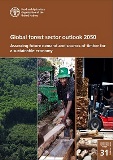Sustainable production and consumption of forest products can help forest conservation, increase forest value and boost climate mitigation efforts

On 4 October 2022, the Special Event "Sustainable wood and non-wood forest products - pathways to carbon-neutral and resilient bioeconomies" was held at FAO, as part of the 8th World Forest Week. The event showcased why and how renewable, carbon-neutral forest products can boost economic recovery and transform the forest sector.
Watch the webcast here
The event was successful in moving forward discussions from the XV World Forestry Congress and the International Day of Forests 2022. Participants were able to connect, exchange, and highlight good practices on the ground, adding to the global debate on forestry and environmental issues.
Ms Ismahane Elouafi, FAO's Chief Scientist, emphasized the importance of forests in accelerating the achievement of SDG 12, sustainable consumption and production, as well as the critical role of science, technology and innovation in maximizing their potential. Earlier this year, at the IDF 2022 in Dubai, the Chief Scientist addressed the role of forests in achieving SDG 12. "Moving forward, we will need to work with scientists, private-sector partners, and civil society to increase the lifespan of wood products, reduce waste through more efficient harvesting and processing, and enhance the sustainability of wood products," she said.
Changing the built environment with sustainable wood
Professor Dr. Dr. Hans Joachim Schellnhuber, Potsdam Institute for Climate Impact Research (PIK), shared an inspiring perspective on how the forest sector can revolutionize the built environment, converting cities into carbon sinks, in the spirit of a New European Bauhaus. He discussed how wood-based solutions could be catalysts for changing the dynamics of urbanization and land use, as well as transitioning away from fossil-based, linear economies. He provided his vision about how producing more wood can reduce emissions, create jobs and transition to a circular bioeconomy. The effort might entail planting “around 500 billion trees” and “building 2 billion new homes”, with wood coming from reforestation, plantations and restored degraded land.
For more information, see the Pontifical Academy of Sciences (PAS) Conference here.
Forest outlook
On behalf of Deputy-Director Ms Tiina Vähänen, FAO Senior Forestry Officer Ms Thaís Linhares-Juvenal launched the report “The Global forest sector outlook 2050: Assessing future demand and sources of timber for a sustainable economy”, providing new evidence to support policymaking on bioeconomy. The report evaluates what is the expected production to meet demands for primary processed wood products, and what policies and investments are required to meet projected demands.
Read the report here.
Panel discussion highlights
The panel discussion, moderated by Henry Bonsu, focused on the sustainable production of wood and non-wood forest products and their role in securing income, food security and livelihoods to millions. It also discussed key policies and the enabling environment needed, including for the private sector, to advance inclusive wood value chains and tackle climate change.
Mr Herve Maidou, COMIFAC, spoke about why forests are vital for sustainable agri-food systems, as they provide livelihoods for millions of people in Central Africa. He emphasized the importance of working with all stakeholders to ensure food security, forest conservation and enhancing the value of NWFP.
Mr Ross Hampton, AFPA, offered his insight - as the ACSFI Chairperson - about the emerging opportunities for the private sector to foster wood value chains, enabling the demand for renewable, carbon-neutral materials to be met in the context of a transition to a circular bioeconomy.
Ms Phosiso Sola, CIFOR – ICRAF, discussed the challenges of creating sustainable wood energy value chains to meet concrete, real and unending demands for wood fuel, in many contexts. She called for urgent action to make clean and affordable energy accessible for millions of people.
Ms Janaína Diniz, University of Brasília, Brazil, provided key elements about wild foods in Brazil and Latin America, in the context of the IPBES assessment. She explained that 5.000 wild species are used around the world, and provide food and income for an estimated 1/5 of people, globally. Often overlooked, invisible and largely underestimated, wild plants are particularly important for vulnerable populations – Indigenous Peoples, children, rural women. She shared the Brazilian experience of harnessing non-wood forest products (NWFP) value chains through the implementation of specific public policies (school meal programs), visibility and social recognition of the value of wild plants, certification schemes and support to collective organization.
Discussing future demand and sources for timber, Ms Sheam Satkuru, ITTO, highlighted the significance of tropical forests, the need to accelerate interfaces between different sectors (private sector, governments, other stakeholders) and made a call for “quick, fast and big” investments in forest resources to tackle climate change and enable forest-based solutions.
Ms Juliette Biao Koudenoukpo, UNFF Director, provided the summary highlighting the significance of wood and non-wood forest products for the economic development.

